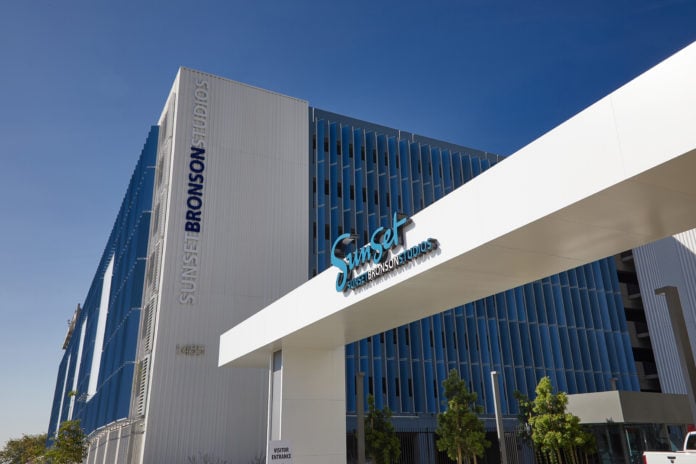Brentwood-based Hudson Pacific Properties Inc. will soon have a new partner in its iconic studio sites in Hollywood.
Blackstone Group Inc. will acquire a 49% interest in Hudson Pacific’s three studios — Sunset Bronson, Sunset Gower and Sunset Las Palmas — as well as adjacent office buildings.
The 2.2-million-square-foot portfolio is valued at $1.65 billion.
Hudson Pacific will own 51% of the properties. The company will also lead day-to-day operations, leasing and development.
The deal, which was announced June 29, is expected to close later this year.
“Hudson Pacific has been at the forefront of Hollywood’s renaissance for more than a decade, owning, operating and building world-class creative office and production campuses for leading media and technology companies,” Victor Coleman, Hudson Pacific’s chief executive, said in a statement.
“Our latest joint venture with Blackstone unlocks a portion of the value we’ve created for our shareholders and provides us with significant capital to grow both our studio and office portfolios, including the build-out of additional development rights at our existing studios.”
“We are pleased to once again align with Blackstone, a trusted and proven strategic partner, who shares our long-term vision for our studio portfolio and the asset class more broadly,” he added.
Last year, Hudson Pacific announced a joint venture with an affiliate of Blackstone to acquire and renovate Bentall Centre, a 1.45-million-square-foot office and retail complex in Vancouver.
Hudson Pacific owns 20% of the joint venture and is responsible for day-to-day operations and development. Blackstone owns 80% and serves as the managing partner.
The companies’ latest joint venture around the Sunset Bronson, Sunset Gower and Sunset Las Palmas studios includes 35 soundstages.
There is also more than 966,000 square feet of office space in the portfolio including the Icon, Cue and Epic buildings.
Los Gatos-based Netflix Inc. is the largest tenant in the portfolio, leasing more than 700,000 square feet.
“Our business is driven by investing thematically in sectors with powerful secular tailwinds, and there is no better example of that than content creation in Los Angeles,” Ken Caplan, global co-head of Blackstone Real Estate, said in a statement.
Hudson Capital, the predecessor of Hudson Pacific, purchased Sunset Gower in 2007 and Sunset Bronson in 2008. In 2017, Hudson Pacific purchased Sunset Las Palmas.
Sunset Gower and Sunset Las Palmas had roughly 1.1 million square feet of development rights.
Eastdil Secured is Hudson Pacific’s lead financial adviser, and BofA Securities is acting as a financial adviser in the transaction. Gibson Dunn & Crutcher and Latham & Watkins are the group’s legal counsel. Simpson Thacher & Bartlett is Blackstone’s legal counsel. Goldman Sachs & Co. and Barclays are Blackstone’s financial advisers.
Hudson Pacific isn’t the only local company interested in soundstages.
Last year, Culver City-based Hackman Capital Partners purchased a company and closed two soundstage purchases for a combined $1.4 billion.
First, the company closed on the previously announced purchase of the iconic Television City studios, a 25-acre campus in the Fairfax area that it acquired from CBS Corp.
Then Hackman and Square Mile Capital Management purchased MBS Group for $650 million from the Carlyle Group. MBS ran MBS Media Campus, or Manhattan Beach Studios, and production services company MBS Services.
MBS Media Campus is a 220-acre facility in Manhattan Beach.
Hackman Capital also owns Culver Studios in Culver City. Amazon Studios has leased a portion of the complex.
Carl Muhlstein, international director at Jones Lang LaSalle Inc., said soundstages are in high demand now.
“We’re on the verge of returning to work and production, and the pent-up demand is tremendous,” he said. “If there is one group of companies that haven’t fallen apart with Covid, it’s been streaming, content, entertainment-related.”
He added that demand for soundstages will likely be high for at least the next five years.
“(Covid) will strengthen the demand for soundstages,” Muhlstein said. “People won’t want to travel far, and productions are going to take longer to shoot because there will be safety monitors and smaller groups and logistical challenges.”

